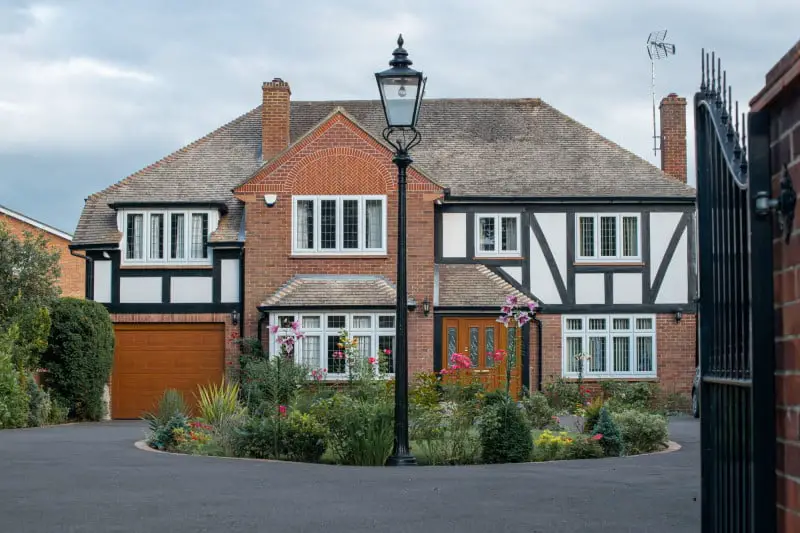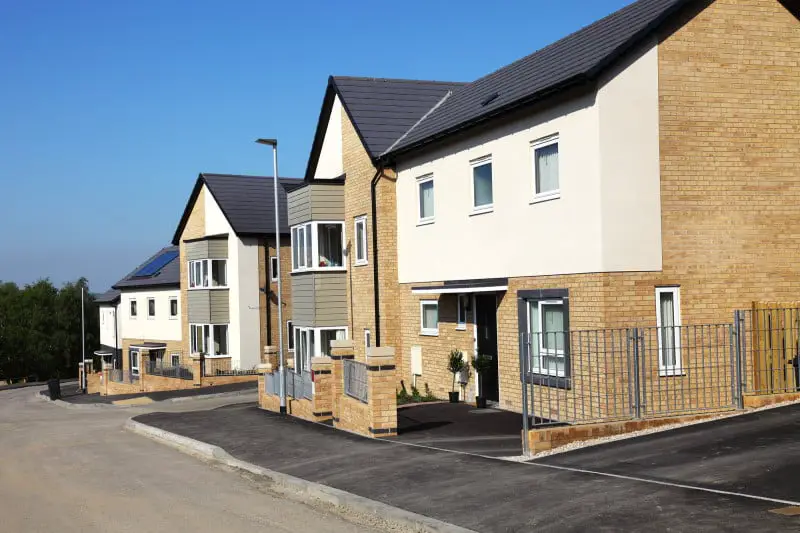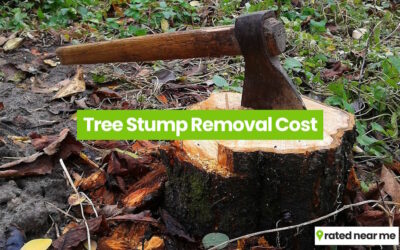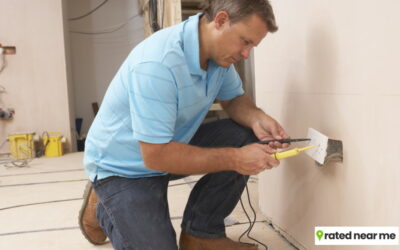Over time, most driveways start showing signs of wear and tear – as the driveway surface detaches and crumbles. If you notice that your driveway needs resurfacing, you should consider installing a tarmac driveway.
Tarmacadam, commonly known as tarmac, is a highly durable driveway material that has been a popular choice of homeowners for years.
It is not only visually appealing and low maintenance, but it can also extend the lifespan of your driveway. If installed correctly, you might not have to replace the tarmac for almost 15 years.
A tarmac driveway can be an excellent choice, but one question remains – how much does an average tarmac driveway cost?
In the following sections, we’ll go over the cost of tarmac driveways in detail and explore the different types of tarmacs and their benefits.
Tarmac Driveway Cost Per m2
The average price of a tarmac driveway in the United Kingdom is around £40-70 per square metre. The table below shows the cost based on the size of the driveway:
| Driveway Size | Cost Range | Average Cost |
|---|---|---|
| 10 square metres | £400 – £700 | £550 |
| 20 square metres | £800 – £1,400 | £1,100 |
| 30 square metres | £1,200 – £2,100 | £1,650 |
| 40 square metres | £1,600 – £2,800 | £2,200 |
| 50 square metres | £2,000 – £3,500 | £2,750 |
| 60 square metres | £2,400 – £4,200 | £3,300 |
| 70 square metres | £3,100 – £4,900 | £3,850 |
Equipment hire or extra materials, such as weed control membrane, is usually included in these costs. Here is a breakdown of the typical costs you can expect to pay:
- Waste skip hire – £50-100 per week
- Mini digger – £150 per week
- Compactor – £35-£50 per day
- Crushed stone – £50-£80 per tonne
- Weed mat underlay – £40 per square metre
Tarmac Compared To Other Surfaces
When it comes to the cost of both driveway materials and installation, generally speaking, tarmac is one of the cheapest and most popular surfaces for driveways.
Here is a comparison of the cost of tarmac compared to other surface finishes:
- Tarmac costs on average £45 per square metre
- A concrete driveway is one of the most expensive, costing around £70 per square metre. It also develops cracks over time and deteriorates quickly in rough weather conditions
- Gravel driveways are relatively cheap at around £35 per square metre. However, when excavation is required, it can cost £50 per square metre. Gravel also involves a lot of maintenance since it is constantly moved around
- Resin is more compact than gravel, which makes it quite durable. The cost of resin driveways can range from £40-70 per square metre
- Paving slabs or block paving comes in around £210 per m2
What affects tarmac driveways costs?

1. Size Of A Driveway
The tarmac driveway’s cost largely depends on the driveway’s size. The cost of laying a new tarmac driveway is calculated on the number of square metres, meaning that a small driveway will cost less than a larger one.
Laying a bigger tarmac driveway also involves more time. This means that the labour costs can increase according to the days required to complete the job.
2. Shape Of Driveway
Since tarmac is usually laid in a semi-liquid form, it’s not difficult to cover an oddly shaped driveway. However, some planning goes into deciding the driveway’s slope to ensure proper rainwater drainage.
Besides this, installing proper edging is another essential task that needs to be completed to ensure that the tarmac driveway does not crack or move.
Edging is usually made from concrete or timber, and the costs can range from £20 to £100 per m2. If it is an oddly-shaped driveway, it means that more edging will be required, which would again increase the price.
3. Preparation Of The Driveway
If you are installing a driveway for the first time, the ground will also have to be prepared. This can add to the timeline of the project, increasing the costs.
If you already have an existing tarmac surface, laying another tarmac drive over it will cost significantly less.
4. Drainage
When driveway contractors are laying the tarmac, they must ensure that it drains properly, allowing any water to run off the driveway and away from the house.
If there is no draining system, the water must be diverted into public waterways. This requires special permission from the local council.
Another option is to create a drainage channel or connect the driveway to existing drainage such as a soakaway.
However, these methods add to the total price as they require extra work days. You can expect the costs to rise by £500 – £1,000 on top of the tarmac driveway price.
5. Location
The cost of labour in the United Kingdom, specifically the south of England, is quite expensive compared to other locations. If the contractor has to travel beyond a certain radius from their base, they might charge an extra fee on top of the cost of laying the tar driveway.
Types Of Tarmac
Do you know what tarmac is?
Tarmacadam, or tarmac, is a dark mixture of tar and aggregates usually laid out as a hot semi-liquid. It is then compacted and levelled to form a driveway with the correct gradient and shape.
It is usually allowed to cool for a few hours, and in this process, the tarmac particles form a hard-wearing and solid surface.
Here are some common types of tarmac which are used for building driveways:
Hot Tarmac
Hot tarmacadam or hot-mix tarmac is probably the most common type used in laying driveways. Hot tarmac is usually heated to 300 to 350 degrees Fahrenheit before installation.
Cold Tarmac
On the other hand, cold tarmacadam or cold lay tarmac is better for low-traffic areas and repair work. It is usually installed by mixing the tarmac material with soapy water.
Cold tarmac also costs less since it doesn’t need to be heated. This makes transporting from one place to another and the installation easier too. The only downside with cold tarmac is that it is not as durable or long-lasting.
Coloured Tarmac
Tarmac is usually black in colour. However, adding a dye to the mix can change the colour to something else. Coloured tarmac is made by combining clear polymer material and some aggregates with standard tarmac.
It usually comes in various colours like green, red, brown, blue and grey. This coloured tarmac is great for adding a unique look to your driveway and home.
However, it can be a bit more expensive than standard tarmac. For instance, red tarmac costs around £60-70 per square metre. It also requires a little more maintenance.
Advantages Of A Tarmac Driveway
A driveway is an integral part of a home. It is the first and last thing people see when they come to visit. A tarred drive is also a great way to improve the appearance of your home and can also add value.

Here are some benefits of installing one:
1. Quick And Easy Installation
Tarmac is not only affordable but very easy to install. It solidifies quickly, which means the job can be completed in a short time. And if any repairs are required in the future, they can be performed promptly too.
2. Durable And Long-Lasting
Your driveway is a space that will be used every day and is likely to experience heavy loads when you park your car or van on it.
Tarmac is the best option for driveways because it is known to be durable and long-lasting. Even if you have multiple vehicles in your household, tarmac driveways will not crack under the load.
3. Easy To Maintain
The end finish of tarmac driveways is smooth, which makes them easier to clean. Tarmac driveways usually require little to no maintenance.
And if the driveway does become damaged at some point, a straightforward repair would fix it. You will not have to install a completely new driveway.
4. Weather Resistant
In the UK, driveways will likely battle the rain every other day. A tarmac driveway is excellent as it does not weather down easily. They can survive all kinds of weather, from sun, rain, and sleet to snow.
Tarmac is also non-slip in nature, which makes walking on it safer even after downpours.
5. Adds Value To Your Property
Tarmac driveways can be seen as an asset for any property. If you plan to sell your house at some point, having a dedicated parking space with a tarmac driveway will undoubtedly be a plus.
Besides adding value to the property, if you don’t have an existing driveway for your car, converting an area of grass into a tarmac driveway could also lower your car insurance premiums since you won’t have to park by the roadside.
Maintaining A Tarmac Driveway
As we’ve mentioned before, tarmac driveways require little to no maintenance.
If you want to keep your tarmac driveway looking good and clean, you can carry out minor maintenance tasks like removing weeds from time to time.
Weeds are common in all driveways, especially near a plant bed or lawn. You can also use a weed killer to prevent them from coming up in the first place.
Besides this, you should also remove any grease or oil stains due to drips from vehicles. If left for a long time, these stains can cause the tarmac to look unsightly, crack and deteriorate.
You can use a power washer or an oil remover to remove these stains.
Tarmac Driveway FAQs
Is tarmac good for driveways?
Tarmac is excellent for driveways and is a common surface on public roads (asphalt being the most common). It is a durable and robust surfacing material that is resilient to heavy vehicles too.
Is tarmac cheaper than paving?
The simple answer is Yes!
Tarmac driveways cost less than paving. Block paving is quite labour intensive – so this pushes tarmac driveway prices up. The average per square metre price of block paving is usually 5% to 10% greater than tarmac.
Is tarmac the same as asphalt?
Although asphalt and tarmac look strikingly similar on the surface, the two have many differences. Asphalt is commonly used for building roads, as it tends to be cheaper for large surface areas.
Tarmac comprises tar and aggregate, whereas asphalt is made from bitumen, sand and aggregate. So, it’s safe to say that tarmac is a better option of the two, given its durability and cost.
Is a tarmac driveway better than a resin driveway?
Tarmac and resin are both excellent options for driveway surfacing. However, Tarmac is a better option if you want cost-effectiveness. While resin driveways can cost up to £70 per square metre, the average cost of tarmac is around £45 per square metre. Other reasons that make tarmac a better option include:
· Durability makes it excellent for withstanding large loads
· Flat and smooth surface
· Can be installed on top of many other surfaces, such as concrete
How long will it take to lay a tarmac driveway?
It can take 1-2 days to 2 weeks to complete a tarmac driveway installation. The length of time taken to complete the driveway depends on a range of factors such as:
· The depth, shape and size of excavation
· Any new drainage required
· If there are any shrubs or tree roots to remove
· Weather conditions
· How many workers are required
For example, in a straightforward 50 square metre driveway, a professional driveway installer will probably take between 2-3 days.
Next Step
If you would like to save money and get free driveway quotes to see how much a tarmac driveway costs, you can use our free service here to find a local tarmac driveway contractor and to compare prices.



